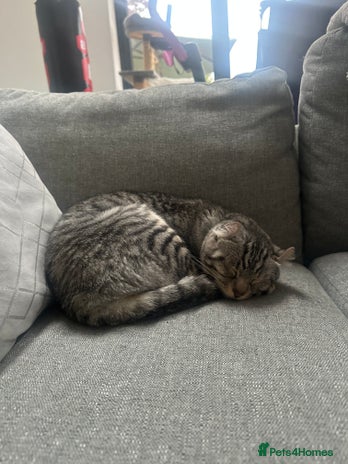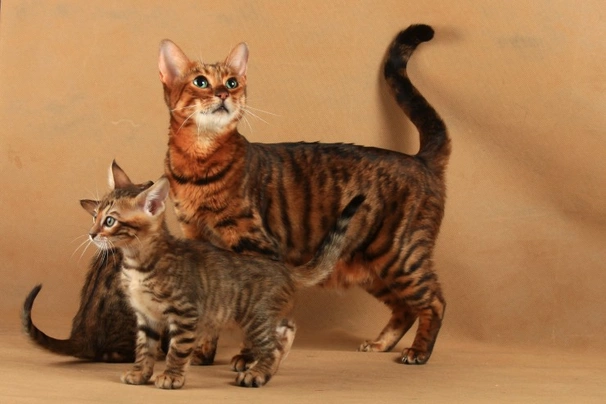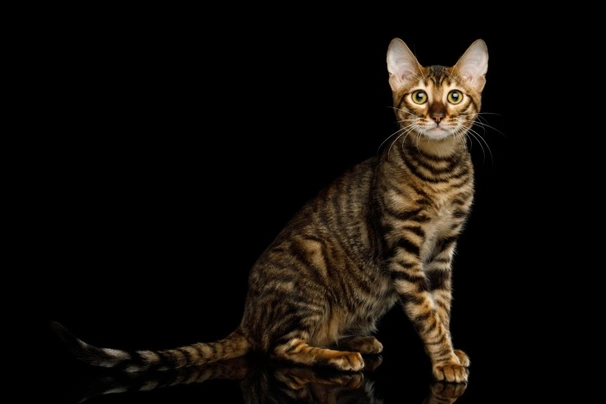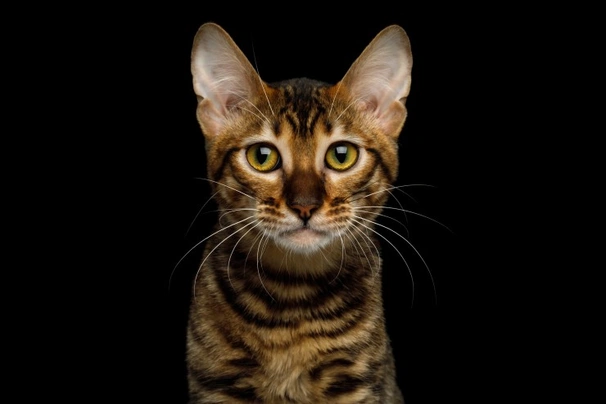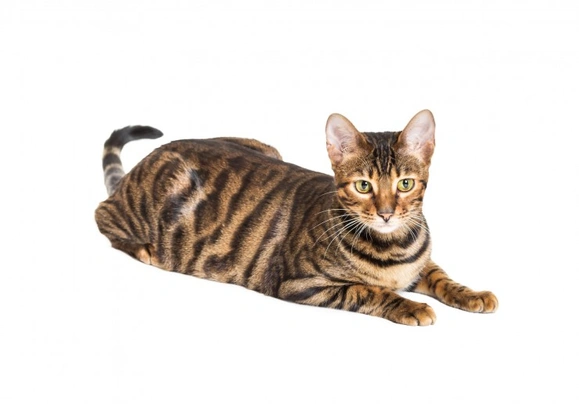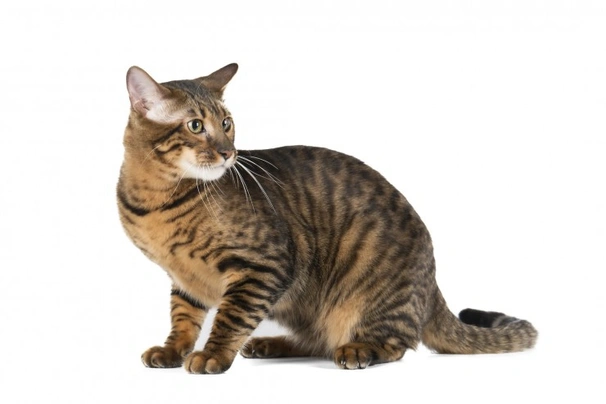Toyger
Introduction of the Toyger
The Toyger is an attractive medium to large size cat that boasts a bit of a "wild" look about them thanks to their stripey coats and athletic lithe low slung bodies. They were first developed in the United States in the eighties and thanks to their wonderful looks they quickly found a large fan base. On top of their good looks Toygers are known to be kind and affectionate which is why they have found their way into the hearts and homes of many people the world over which includes here in the UK.
History of the Toyger
The Toyger is a relatively new breed having been first developed in the United States in the 1980s by a breeder called Judy Sugden whose mother was the founder of the Bengal. She was attempting to improve the markings seen in mackerel tabbies that were descendants of Bengals and other breeds. One of her cats boasted having two tabby marking spots on their temple and she decided this could be the key to developing the sort of circular pattern seen on a tiger's head. The two cats that formed the foundation stock for Toygers were a domestic shorthair with a striped coat and a large Bengal that boasted being a big boned cat.
A little later in 1993 the breeder imported another street cat from Kashmir and used him in her breeding programme and she chose him because he had spots between the ears. Her end goal was to develop a domestic cat that boasted having the coat of a wild tiger and she was successful in her endeavours not only did she manage to produce a cat with an extremely well-defined striking coat but also a cat that boasted a laid-back personality that meant they were a pleasure to share a home with.
Pretty soon other breeders became interested in developing the breed which soon led to Toygers being accepted by international breed clubs. The breed was awarded recognition by the GCCF in June 2016. Today Toygers are fast gaining a large fan base not only in the UK but elsewhere in the world thanks to their good looks and their kind affectionate and laid-back natures.
Appearance of the Toyger
The Toyger was developed so their coats resembled that of a wild tiger. They boast having the Bengal in their lineage although they are very different looking cats. They are medium to large in size and have lithe well-muscled and low slung bodies which gives them their sleek appearance. Females tend to be that much lighter and smaller than their male counterparts but both have long broad medium sized wedge shaped heads that are nicely in proportion to their bodies. Muzzles are strong and look very similar to an inverted heart with cats having well-defined prominent whisker pads. Ears are small nicely rounded and set well apart on a cat's head. Cats have thick furring on their temples and ears but no tufts on their ears.
The Toyger has small to medium sized round eyes with a little hooding and which slant towards the base of a cat's ears. They always have a kind serious look about their eyes. Seen in profile cats have a nice angle at their foreheads with the line to the bridge of the nose being virtually straight with just a hint of a concave curve. Noses are long and nicely rounded having a muscular look about them. Chins are deep and wide being strong and prominent.
Toygers have long muscular necks which are nicely in proportion to the rest of their bodies with males having more of a jowl than their female counterparts. They have medium to large size muscular sleek bodies with nicely defined contours. Chests are broad and deep which adds to the Toygers athletic appearance. Legs are straight strong and well-muscled being moderately long with both back legs and front ones being the same length. Paws are moderately large and nicely rounded with cats having prominent knuckles and rather long toes. Their tails are very long thick and muscular with the tip being rounded. Tails are set low and carried low which adds to the Toygers wild appearance.
When it comes to their coat the Toyger boasts having a very dense and luxurious coat with a modified mackerel tabby pattern that branches and interweaves the stripes found in their coats. The only recognised colour for the breed is as follows:
- Brown (black) mackerel tabby
Temperament of the Toyger
Like a lot of other breeds the Toyger likes a routine and doesn't particularly like it when this changes for any reason. They like to be fed at the same time of the day and don't appreciate it when furniture gets moved around the home which can stress cats out. With this said and thanks to extremely careful and selective breeding the Toyger is known to be outgoing social and confident by nature and a cat that adores being in a home environment and around people.
They are smart and learn new things quickly which includes playing interactive games with their owners. However because they form strong ties with their families Toygers don't particularly like being left on their own even for shorter periods of time. As such they are best suited to families where at least one person stays at home when everyone else is out of the house or where there are other cats or pets to keep them company.
Toygers like to explore the great outdoors but should only be allowed to roam outside if it is safe for them to do so. The good news is they adapt well to living as indoor pets but only as long as they are given lots of mental stimulation and things to keep them occupied. Sharing a home with a Toyger means investing in a lot of good quality toys scratching posts and building high platforms where cats can climb up to so they can look down on what's happening below from a high vantage point. They are not overly talkative but will happily hold a conversation with an owner when spoken to and can be more vocal when it's meal time.
Intelligence / Trainability of the Toyger
The Toyger is known to be a highly intelligent cat and one that enjoys being taught to do lots of things which includes games like "fetch". Being so intelligent and quite energetic they also enjoy being around other cats because they are quite gregarious by nature. As such they are best suited to households where there are other cats or dogs rather than being kept as an only pet.
Children and other
Toygers with their outgoing affectionate personalities are a good choice for families with children and this includes toddlers. They are quick on their feet and therefore know when to get out of the reach of smaller children when they get too boisterous or loud. However care has to be taken when very young children are around cats and any interaction should always be well supervised by an adult to make sure things stay nice and calm. With this said children need to be taught how to behave around cats and when it's time to leave them alone.
They also get on well with dogs especially if they have grown up together in the same household because they enjoy their company. However care has to be taken when introducing a Toyger to dogs they don't already know just in case the dog does not get on with their feline counterparts. Because they are social by nature Toygers have been known to get on with pet birds and small animals. However it's always wiser to keep a close eye on any cat when they are around smaller pets particularly when they first meet each other just to be on the safe side.
Health of the Toyger
The average life expectancy of a Toyger is between 12 and 15 years when properly cared for and fed an appropriate good quality diet to suit their ages.
The Toyger is known to be a healthy breed although certain health conditions that affect the Bengal which are as follows:
- Progressive retinal atrophy (PRA) - breeders should have stud cats DNA tested
- Hypertrophic cardiomyopathy (HCM) - breeders should have stud cats DNA tested
- Cow hocks - some lines occasionally have this condition but through selective and careful breeding the condition is now rarely seen
- Agalactia (reduced milk production - this condition has been reported in some lines
Caring for the Toyger
As with any other breed Toygers need to be groomed on a regular basis to make sure their coats and skin are kept in top condition. On top of this cats need to be fed good quality food that meets all their nutritional needs throughout their lives which is especially true of kittens and older cats.
Grooming of the Toyger
Toygers boast having short close lying coats and as such they are low maintenance on the grooming front. A weekly brush and wipe over with a chamois leather is all it takes to keep their coats in good condition with a nice sheen on it. Like other breeds they tend to shed the most in the Spring and then again in the Autumn when more frequent brushing is usually necessary to keep on top of things.
It's also important to check a cat's ears on a regular basis and to clean them when necessary. If too much wax is allowed to build up it can lead to a painful infection which can be hard to clear up. In short prevention is often easier than cure with ear infections. Cats often suffer from ear mites which can be a real problem which is why it's so important to check their ears on a regular basis.
Exercise of the Toyger
Toygers are energetic cats but they also boast being easy going by nature. They love playing interactive games like fetch and will happily keep themselves entertained when given good quality toys to play with. They enjoy the company of other cats and dogs they have grown up with in the same household because they don't particularly like being left on their own for any length of time. As such they are best suited to households where there are other pets or where at least one person stays at home when everyone else is out. They love being able to roam around in the great outdoors but cats should only be allowed to explore their outside environment if it is safe for them to do so. The good news is that Toygers adapt well to being kept as indoor cats.
However cats kept as indoor pets need to be given lots of things to do and places to hide when they want to bearing in mind that the Toyger loves to climb up high so they can look down on the world from a high vantage point. They also need to have lots of places they can snuggle up for a snooze when the mood takes them because if there is one thing Toygers are exceptionally good at doing it’s taking a few cat naps throughout the day.
Feeding of the Toyger
If you get a Toyger kitten from a breeder they would give you a feeding schedule and it's important to stick to the same routine feeding the same kitten food to avoid any tummy upsets. You can change a kitten's diet but this needs to be done very gradually always making sure they don't develop any digestive upsets and if they do it's best to put them back on their original diet and to discuss things with the vet before attempting to change it again.
Older cats are not known to be fussy eaters but this does not mean they can be given a lower quality diet. It's best to feed a mature cat several times a day making sure it's good quality food that meets all their nutritional requirements which is especially important as cats get older. It's also essential to keep an eye on a cat's weight because if they start to put on too much it can have a serious impact on their overall health and wellbeing. Like all other breeds Toygers need access to fresh clean water at all times.
Toyger price
If you are looking to buy an Toyger you would need to pay from £600 to over £1500 for a well-bred pedigree kitten. The cost of insuring a male 3-year-old Toyger in northern England would be £15.60 a month for basic cover but for a lifetime policy this would set you back £27.60 a month (quote as of April 2018). When insurance companies calculate a pet's premium they factor in several things which includes where you live in the UK a cat's age and whether or not they have been neutered or spayed among other things.
When it comes to food costs you need to buy the best quality food whether wet or dry making sure it suits the different stages of a cat’s life. This would set you back between £15 - £20 a month. On top of all of this you need to factor in veterinary costs if you want to share your home with a Toyger and this includes their initial vaccinations their annual boosters the cost of neutering or spaying a cat when the time is right and their yearly health checks all of which quickly adds up to over £600 a year.
As a rough guide the average cost to keep and care for a Toyger would be between £40 to £60 a month depending on the level of insurance cover you opt to buy for your cat but this does not include the initial cost of buying a well-bred kitten.

Kittens for sale
£50
Toyger Kittens female available
£100